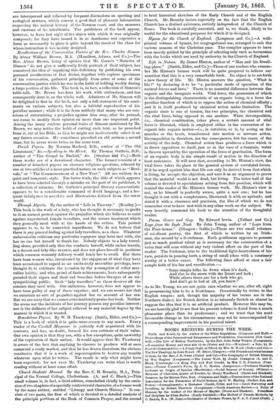Life in Nature. By James Hinton, author of "Man and
his Dwell- ing-place." (Smith, Elder, and Co.)—Those of our readers who remem- ber Mr. Hinton's former work will be quite prepared to believe our assertion that this is a very remarkable book. Its object is to set forth a new theory of life. Mr. Hinton answers the question, "What is life I" by declaring it to be "a particular mode of operation of the natural forces and laws." There is no essential difference between the organic and the inorganic world. Vital force, the possession of which is the distinguishing characteristic of an organic being, is a force the peculiar function of which is to oppose the action of chemical affinity ; and it is itself produced by chemical action under limitation. The organic state is one of tension, the two principles, the chemical and the vital force, being opposed to one another. When decomposition, i.e., chemical combination, takes place, a certain amount of vital force is liberated, which is employed either in the conversion of in- organic into organic matter—i.e., in nutrition, or is, by acting on the muscles or the brain, transformed into motion or nervous action. Decomposition is, therefore, not the consequence, but the cause, of the activity of the body. Chemical action thus produces a force which is in direct opposition to itself, just as in the case of a fountain, water is thrown upward by the operation of the force of gravitation. The forna of an organic body is the simple result of motion in the direction of least resistance. It will seen that, according to Mr. Hinton's view, the vital force takes its place in the general system of correlated forces. If it be urged against him that life can only be derived from that which is living, he accepts the objection, and uses it as an argument to prove that the material world is not dead, but living. The latter half of the volume is devoted to speculations arising from this position, which will remind the reader of Mr. Hinton's former work. Mr. Hinton's view is not, as he himself is perfectly aware, quite a new one; but he has thought it out with a completeness, illustrated it with an aptitude, and stated it with a clearness and precision, the like of which we do not remember ever to have met with in any other work on the subject. We very heartily commend his book to the attention of the thoughtful reader.






























 Previous page
Previous page